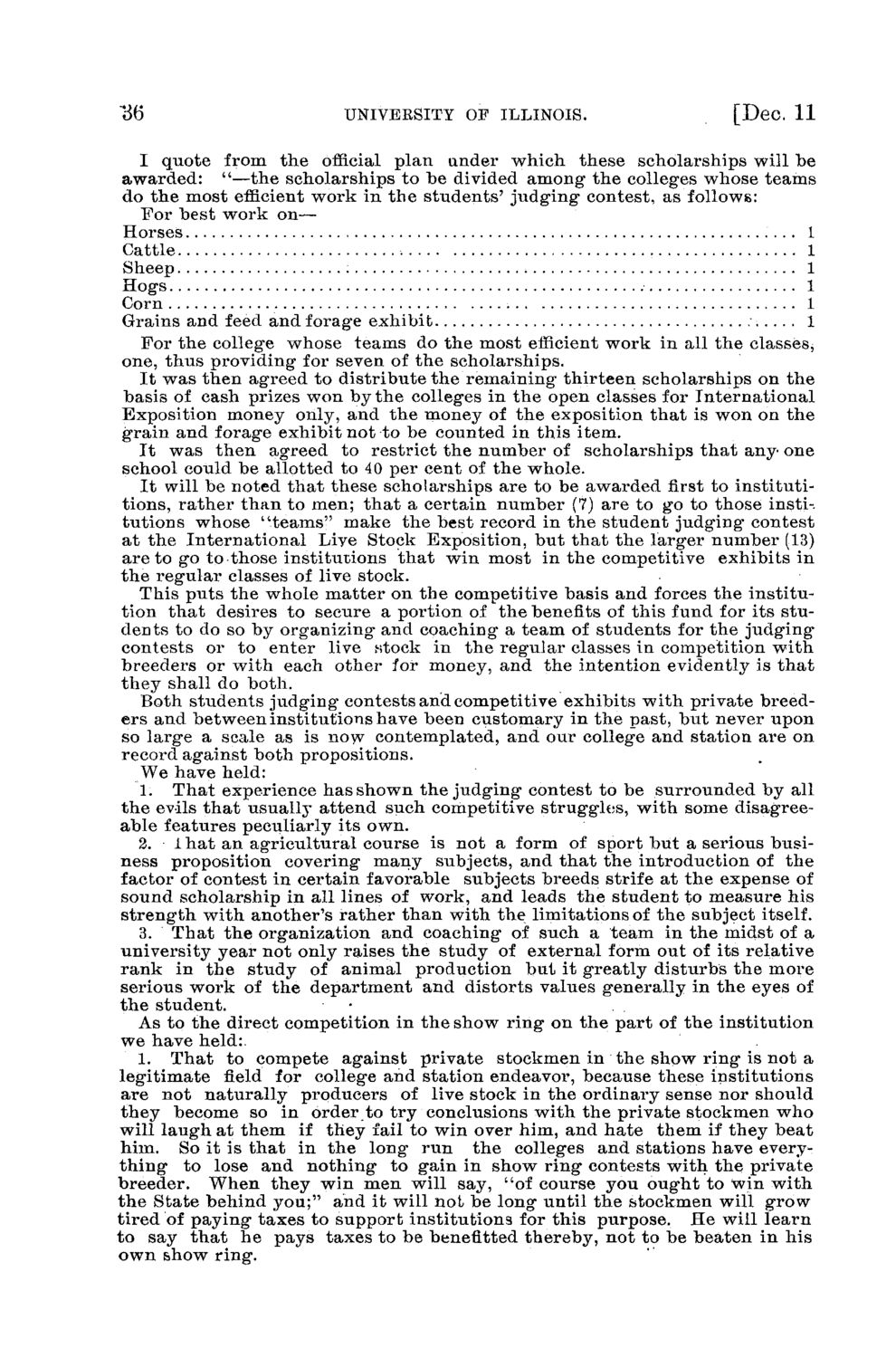| |
| |
Caption: Board of Trustees Minutes - 1908
This is a reduced-resolution page image for fast online browsing.

EXTRACTED TEXT FROM PAGE:
36 UNIVEKSITY OP ILLINOIS. [Dec. 11 I quote from the official plan under which these scholarships will be awarded: "—the scholarships to be divided among the colleges whose teams do the most efficient work in the students' judging contest, as follows: For best work on— Horses 1 Cattle 1 Sheep 1 Hogs 1 Corn 1 Grains and feed and forage exhibit 1 For the college whose teams do the most efficient work in all the classes, one, thus providing for seven of the scholarships. It was then agreed to distribute the remaining thirteen scholarships on the basis of cash prizes won by the colleges in the open classes for International Exposition money only, and the money of the exposition that is won on the grain and forage exhibit not to be counted in this item. It was then agreed to restrict the number of scholarships that any one school could be allotted to 40 per cent of the whole. It will be noted that these scholarships are to be awarded first to institutitions, rather than to men; that a certain number (7) are to go to those institutions whose "teams" make the best record in the student judging contest at the International Liye Stock Exposition, but that the larger number (13) are to go to those institutions that win most in the competitive exhibits in the regular classes of live stock. This puts the whole matter on the competitive basis and forces the institution that desires to secure a portion of the benefits of this fund for its students to do so by organizing and coaching a team of students for the judging contests or to enter live stock in the regular classes in competition with breeders or with each other for money, and the intention evidently is that they shall do both. Both students judging contests and competitive exhibits with private breeders and between institutions have been customary in the past, but never upon so large a scale as is now contemplated, and our college and station are on record against both propositions. We have held: 1. That experience has shown the judging contest to be surrounded by all the evils that usualty attend such competitive struggles, with some disagreeable features peculiarly its own. 2. i hat an agricultural course is not a form of sport but a serious business proposition covering many subjects, and that the introduction of the factor of contest in certain favorable subjects breeds strife at the expense of sound scholarship in all lines of work, and leads the student to measure his strength with another's rather than with the limitations of the subject itself. 3. That the organization and coaching of such a team in the midst of a university year not only raises the study of external form out of its relative rank in the study of animal production but it greatly disturbs the more serious work of the department and distorts values generally in the eyes of the student. • As to the direct competition in the show ring on the part of the institution we have held:. 1. That to compete against private stockmen in the show ring is not a legitimate field for college and station endeavor, because these institutions are not naturally producers of live stock in the ordinary sense nor should they become so in order to try conclusions with the private stockmen who will laugh at them if they fail to win over him, and hate them if they beat him. So it is that in the long run the colleges and stations have everything to lose and nothing to gain in show ring contests with the private breeder. When they win men will say, "of course you ought to win with the State behind you;" and it will not be long until the stockmen will grow tired of paying taxes to support institutions for this purpose. He will learn to say that he pays taxes to be benefitted thereby, not to be beaten in his own show ring.
| |